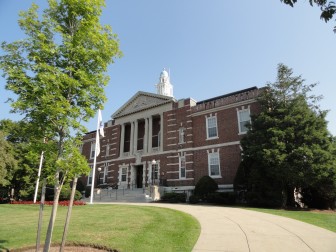
Watertown Town Hall
In hopes of attracting more restaurants and commercial or mixed-use developments, Town Councilors have been exploring how to add up up to 15 liquor licenses in town, but they still must figure out where to put them.
Watertown has 32 liquor licenses given to the town by the state through a quota system based on the town’s population. Communities can ask for more through a special act of the State Legislature, which is what the Town Council plans to do. A joint group Council subcommittee – Rules & Ordinances, Economic Development & Planning, and Public Safety – met Tuesday to discuss the issue.
The group looked at adding 15 to accommodate recently approved projects with restaurants, projects coming down the line with restaurants and some of additional projects.
After a discussion, the group tentatively decided to give four to approved or existing projects – mixed-use project at Howard and Bacon streets, the complex at 202 Arsenal St., the Residence Inn by Marriott hotel on Arsenal Street and the Arsenal Center for the Arts. Another will be given to athenahealth for their planned renovation of the Arsenal on the Charles.
Where the rest will go was a matter of much discussion. Because the licenses are being sought to promote new economic development, some will go to projects in five economic development areas identified in the 2011 Economic Development Plan. The areas are:
- Arsenal North – behind the Watertown Mall and along part of Arsenal Street)
- West End of Pleasant Street near the Charles River
- South Square – south of the Charles near Galen Street
- Union Market – the area along Arsenal Street across from Toyota of Watertown
- Coolidge Hill – the area off Arlington and Grove streets and Coolidge Avenue
Councilor Aaron Dushku said that he would like to see new restaurants come to Watertown Square and Coolidge Square, but those areas are not in any of the five zones. The councilors agreed that some could go in those areas, but decided to limit to a maximum of two.
Much of the new development is coming along Arsenal Street, but East End Town Councilor Ken Woodland said he did not want the East End to be left out.
“Pleasant Street might miss out on haven a license if it is slower than other areas to develop,” Woodland said.
The group agreed that one of the licenses would got to a restaurant in the Pleasant Street Corridor.
The town has also received a request for eight licenses for the renovation of the Arsenal Project. The group agreed to allow the Arsenal Project apply for some of the unassigned liquor licenses. If the licenses are gone before the Arsenal Project’s plans are complete, the town could request more licenses, Councilor Vincent Piccirilli said.
Current liquor license holders came to previous meetings and said they worry about the value of their licenses dropping if more licenses are given out. They also worry about whether Watertown can support an influx of new restaurants.
The existing liquor licenses can be sold and transferred between owners. Director of Community Development and Planning Steve Magoon said he does not know exact sales prices, partly because they are sometimes included in the sale of a building, but he has seen prices from $50,000 to more than $150,000.
The new ones would not be transferable, so if a business stopped using one it would go back to the town to award to another business.
Town Councilors said they do not want to hurt current license holders, so they want to make a more level playing field. To do so, the plan to charge an annual license fee. This would be on top of the $2,700 all license holders pay to have a liquor license.
Woodland suggested having the fee add up to the average price of one of the current licenses if the new license was held for 10 years. Other councilors agreed with the idea, but no dollar amount for the fee was set.
Councilors debated whether to open up the new licenses to existing restaurants who do not have a liquor license. Councilor Susan Falkoff said she spoke to the owner of Uncommon Grounds who asked if the restaurant could get one of the new licenses.
Council Vice President Steve Corbett said he wants to reserve them for new projects. Piccirilli said it could make things complicated if the licenses are open to existing restaurants.
“We are getting the licenses to encourage economic growth,” Piccirilli said. “To me, it muddies the water to say we are opening it up to anyone else in town.”
Dushku has suggested the idea of allowing restaurants to have bring your own bottle (BYOB) policies. The town currently does not allow this, but he asked if the idea could be considered at the next subcommittee meeting, adding that it could make sense for existing restaurants which do not have liquor licenses.
The subcommittees will meet again on Oct. 27 to work out the details of the liquor license request they plan to send to the state.